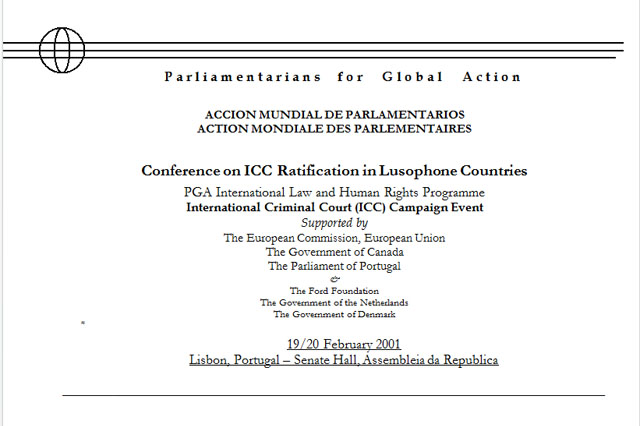Cape Verde signed the Rome Statute on 28 December 2000
Rome Statute Ratification Status:
Cape Verde deposited its instrument of ratification of the Rome Statute on 10 October 2011 becoming the 119th State Party to the Rome Statute. PGA Press Release on the ratification of Cape Verde.
Rome Statute Ratification Process:
The ratification process of Cape Verde was subject to the completion of the revision of the Constitution. A committee for the revision of the constitution of Cape Verde, chaired by José Manuel Andrade, MP from the governmental party and Joana Rosa, MP from the opposition and composed by 13 MPs was established on 4 February 2009. An ICC clause was finally adopted with bipartisan support into the Constitution of Cape Verde early 2010 and published on the Official Gazette on 3 May 2010 as Constitutional Law No. 1/VII/2010. Thereafter, the National Assembly of Cape Verde approved unanimously the ratification bill of the Rome Statute on 1 of July 2011.
Implementation Status:
The Penal Code amended through the Decree No. 4/2003 (18 November 2003) includes in its Title IV 'Crimes against International Community' some provisions covering genocide, and some modalities of crimes against humanity, war crimes and the crime of aggression.
Constitutional Law No. 1/VII/2010 published on 3 May 2010, inserts two ICC-clauses in the Constitution of Cape Verde.
Article 11(8) states that "with a view to achieving an international justice that promotes respect for the rights of both individual human persons and peoples, and subject to the provisions governing complementarity and the other terms laid down in the Rome Statute, Cape Verde may accept the jurisdiction of the International Criminal Court."
Article 37(5) indicates that existing restrictions to extradition from Cape Verde do not prevent the exercise of the jurisdiction by the ICC, subject to the provisions governing complementarity and the other terms laid down in the Rome Statute.
Progress and PGA Action:
PGA initiated work on Cape Verde through the Speaker of the Parliament, Mr. Aristides Lima and other MPs since February 2001, at the Lisbon Lusophone Conference that PGA organised in the Assembleia da Republica of Portugal.
In 2003, Mr. Joao Batista Pereira, MP, Deputy Chair of the Legal & Constitutional Affairs participated in the II session of PGA's Consultative Assembly of Parliamentarians for the ICC and the Rule of Law held in New York.
In March 2004, a delegation of parliamentarians from Cape Verde attended PGA's II Iberoamerican and Lusophone Parliamentary Conference that took place in Brasilia and committed to support the ICC through the Brasilia Parliamentary Declaration on the ICC.
Between 2009 and early 2010, PGA facilitated a bipartisan agreement within the committee for the revision of the constitution of Cape Verde and the plenary of Parliament, in particular via a letter that PGA drafted by Dep. Alessandro Forlani, MP (Italy) and Dep. Pierferdinando Casini, MP (Italy) Co-Presidents of the Centrist Democrats International appealing to the Cape Verde's leader of the opposition to join a constitutional consensus pro-ICC.
On 1 July 2011, the National Assembly of Cape Verde approved unanimously the ratification bill of the Rome Statute.
International and Trans-regional Commitments against the Impunity
As a member of the African, Caribbean and Pacific community (ACP) and as signatory of the revised Cotonou Agreement between the ACP and European Union, Cape Verde has recognized the importance of the ICC as a mechanism for peace and international justice. It has committed to promote the ratification and implementation of the Rome Statute, to seek to take steps towards ratification and implementation of the Rome Statute and to fight against international crime giving due regard to the Rome Statute.
For more information on the work of PGA within the ACP-EU mechanism see, click here.
Respect to the Integrity of the Rome Statute
Reportedly in 2004, Cape Verde signed with the United States an executive agreement of non-surrender of individuals to the ICC. It is not confirmed whether this international agreement was ever ratified by the Parliament as required by domestic law.
PGA continues engaging MPs to ensure the ratification of the APIC, the adoption of adequate legislation to cooperate with the ICC and to ensure the operation of the principle of complementarity and the prevention of ICC crimes, and to promote the ratification of the 2010 Kampala Amendments to the Rome Statute.










